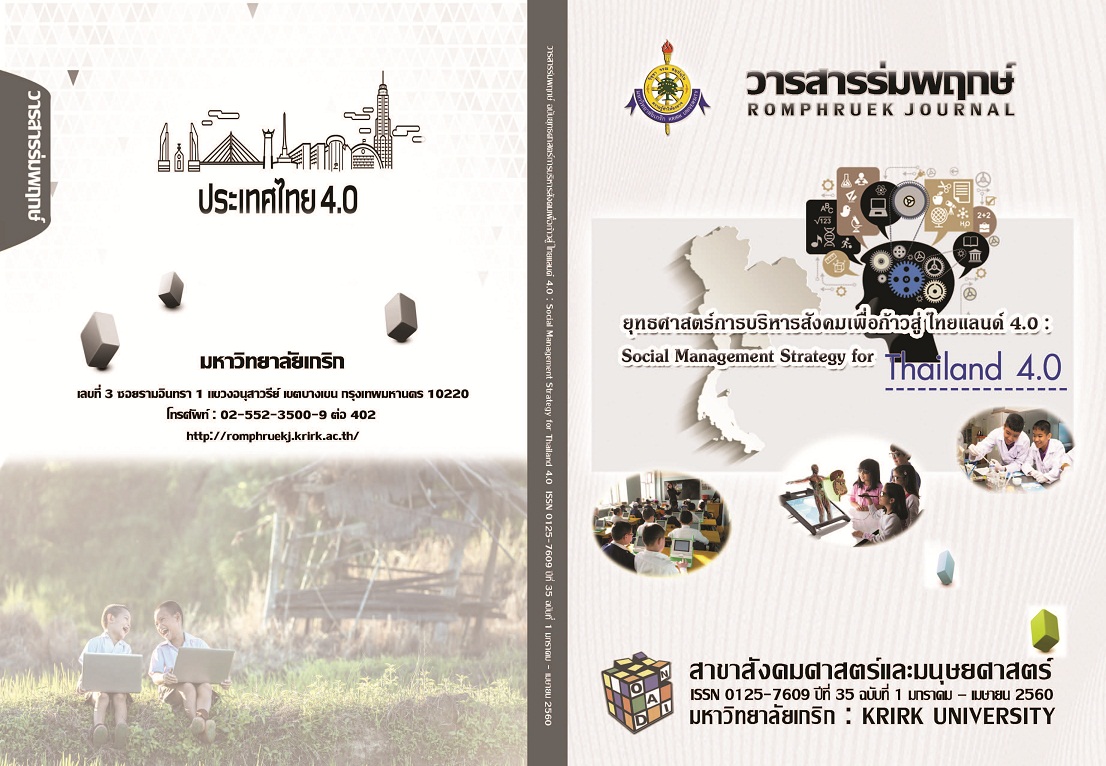Sufficiency Economy Philosophy and Management of Universities in the Thailand 4.0 Era
Main Article Content
Abstract
This article aims to present the application of the sufficiency economy philosophy for university management in accordance with the strate of national development of Thailand 4.0 policy. The study finds that the concept of “three circles : moderation, reasonableness, and self-immunity-along with the conditions of knowledge and morality” is very abstract, as a result, it is necessary to transform into concrete before utilizing. The characteristics of university management in the era of Thailand 4.0 according to the sufficiency economy philosophy are as follows: emphasizing the importance of all groups of stakeholders – lecturers, officers, students, community, graduates’ users, etc. ; utilizing steady growth policy ; not using a large amount of loans for investment; and supporting knowledge management as well as learning organization. Curriculums should be suitable to the demands of the Thailand 4.0 labor market focusing on creating students to occupy the ability of using foreign languages, creative thinking, systematic analyses, ability of using digital tools, enhancement of live skills and commitment to morality.
Article Details
Every article published in the Romphruek Journal of the Humanities and Social Sciences is the opinion and point of view of the authors. Thery're not the viewpoint of Krirk University or the editored department. Any part or all of the articles for pablication must be clearly cited.
References
กองบริหารงานวิจัยและประกันคุณภาพการศึกษา. Thailand 4.0 : โมเดลขับเคลื่อนประเทศไทยสู่ความมั่งคั่ง มั่นคง และยั่งยืน. (29 March 2017) สืบค้นจาก http://www.libarts.up.ac.th/v2/img/Thailand-4.0.pdf
ณดา จันทร์สม. (2555.) การประยุกต์ปรัชญาของเศรษฐกิจพอเพียงในระดับบุคคล. ศูนย์ศึกษาเศรษฐกิจพอเพียง สถาบันบัณฑิตพัฒนบริหารศาสตร์, กรุงเทพฯ.
ดาวิษา ศรีธัญรัตน์. (2559.) AUN-QA Guidebook. กรุงเทพฯ : สถาบันบัณฑิตพัฒนบริหารศาสตร์.(เอกสารอัดสำเนา)
ณัฏฐพงศ์ ทองภักดี. (2007.) ปรัชญาของเศรษฐกิจพอเพียง : ความเป็นมาและความหมาย. NIDA Development Journal, 47(1) (1-24).
ธันวา จิตต์สงวน. (2554.) ปรัชญาของเศรษฐกิจพอเพียงกับภาคการเกษตร. ปรัชญาของเศรษฐกิจพอเพียงกับ สังคมไทย, (229-248).
พงศา ชูแนม. (2554.) การประยุกต์ปรัชญาของเศรษฐกิจพอเพียงในระดับชุมชน. ปรัชญาของเศรษฐกิจพอเพียงกับสังคมไทย, (154-168).
ราศี บุรษรัตนพันธุ์. (2542.) ทฤษฎีใหม่ในหลวง: ชีวิตที่พอเพียง, กรุงเทพฯ : สำนักพิมพ์ร่วมด้วยช่วยกัน.
สำนักเลขาธิการนายกรัฐมนตรี ทำเนียบรัฐบาล. (2560.) Startup Thailand 4.0. วารสารไทยคู่ฟ้า, ศูนย์ศึกษาเศรษฐกิจพอเพียง
สถาบันบัณฑิตพัฒนบริหารศาสตร์. (2554.) ปรัชญาของเศรษฐกิจพอเพียงกับสังคมไทย. กรุงเทพฯ : สถาบันบัณฑิตพัฒนบริหารศาสตร์.
ศูนย์ศึกษาเศรษฐกิจพอเพียง สถาบันบัณฑิตพัฒนบริหารศาสตร์. (2551.) ปรัชญาของเศรษฐกิจพอเพียงกับการบริหารการพัฒนา. กรุงเทพฯ : สถาบันบัณฑิตพัฒนบริหารศาสตร์.
Achua, C. F. & R. N. Lussier. (2013.) Effective Leadership. South-Western : Cengage Learning.
Ariratana, Wallapha Pattamaporn Pimthong & Nitmanee Pitak. (2013.) Teacher Professional Development for Learning Organization on Sufficiency Economy in Small School. The European Journal of Social & Behavioral Sciences, 4(1) 847-852.
Avery, G. C. & H. Bergsteiner. (2016.) Editors Preface. Sydney : Allen & Unwin.
Avery, G.C. & H. Bergsteiner. (2016.) Thailand : An Unexpected Role Model. Sydney : Allen & Unwin.
Avery, G.C. & H. Bergsteiner. (2016.) Practices for Enhancing Resilience and Performance. Sydney : Allen & Unwin.
Bergsteiner, H. & Priyanut Dharmapiya. (2016.) The Sufficiency Economy Philosophy Process. Sydney: Allen & Unwin.
Buranapin, Siriwut & Thankawin Ratthawatankul. (2015.) Philosophy of Sufficiency Economy and Business Sustainability : A Framework for Operational Implications. Journal of Business Behavioral Sciences, 27(1), 115-140.
Chaisumritchoke, Suntharee T. (2007.) Sufficiency Economy, The King’s Philosophy : An Application of Buddhist Economics to Develop Thai Local Pharmaceutical Industries for Sustainable Well-being. Society and Economy, 29, 235-252.
Choochom, Oraphin. (2015.) A Causal Relationship of Living Behavior Based on Sufficiency Economy Philosophy for Thai University Students. Procedia -Social and Behavioral Sciences, 177, 260-264.
Dharmapiya, Priyanut and Molraudee Saratun. (2016.) Cultivating a Sufficiency Mindset in Thai Schools’ in Sufficiency Thinking : Thailand’s Gift to an Unsustainable World. Sydney : Allen & Unwin.
Dunfee, T.W. (2012.) Stakeholder Theory : Managing Corporate Social Responsibility in a Multiple Actor Context. Oxford ; Oxford University Press.
Himathongkam, Thep and Tanya Vannapruegs. (2016.) Sufficiency in Thai Healthcare. Sydney : Allen & Unwin.
Kantabutra, Sooksan & Warat Winit. (2016.) The Sufficiency Economy in Action at Nithi Foods. Sydney : Allen & Unwin.
Kantabutra, Sooksan. (2016.) From Philosophy to Business Practice. Sydney : Allen & Unwin.
Khunthongjan, Supawadee & Aree Wiboonpongse. (2010.) A Study of Performance of SMEs in Their Application of Sufficiency Economy Philosophy. GMSARN International Journal, 4, 177-182.
Mele, D. (2012.) Corporate Social Responsibility Theories. Oxford : Oxford University Press.
Naipinit, Aree Thongphon Promsaka Na Sakolnakorn & Patarapong Kroeksakul. (2014.) Sufficiency Economy for Social and Environmental Sustainability : A Case Study of Four Villages in Rural Thailand. Asian Social Science, 10(2),102-111.
Piboolsravut, Priyanut. (2004.) Sufficiency Economy : Research Note. ASEAN Economic Bulletin, 21(1), 127-134.
Pruetipibultham, Oranuch. (2010.) The Sufficiency Economy Philosophy and Strategic HRD : A Sustainable Development for Thailand. Human Resource Development International, 13(1), 99-110.
Rungruang, Parisa & Vichita Vathanophas Ractham. (2016.) Siam Cement Group as a Sustainable Enterpris. Sydney : Allen & Unwin.
Thongpakde, Nattapong Prasopchoke Mongsawad & H. Bergsteiner. Immoral Capitalism : The Need for a New Approach. Sydney : Allen & Unwin.
Thongpoon, Siriluck Noor Hazlina Ahmad & Sofri Yahya. (2012.) Sustainable Performance of Thai SMEs : Investigating the Entrepreneurial Competencies and Sufficiency Economy Phiposophy. Asia Pacific Journal of Management & Entrepreneurship Research, 1(2), 5-20.
Treputtarat, Saowanee Wallapha Arirattana & Siripong Piasiri. (2013.) Integrated Management Model for Learning Organization on Sufficiency Economy in Small School, Thailand The European Journal of Social & ฺBehavioral Sciences, 4(1), 856-860.
Tungkasamit, Angkana Ladda Silanoi Teerachai Nethanomsak & Pattamaporn Pimthong. (2014.) Evaluation of school Activities for Developing the Desired Characteristics based on Sufficiency Economy Philosophy : A Project Report. Procedia – Social and Behavioral Sciences, 116.
UNDP. (2007.) Thailand Report on Human Development: Sufficiency Economy and Human Development, Thailand, United Nations Development Programme.
Wanasilp, Wanakiti & Nantarat Tangvitoontham. (2015.) The Relationship between the Understanding of Philosophy of Sufficiency Economy and the Living Standard : The Case Study of Sufficiency Economy Community in Lower Northern Region of Thailand. International Journal of Business and Economic Development, 3(1), 87-95.
Wood, D. J. (2002.) Business Citizenship: From Individuals to Organizations. Business Ethics Quarterly, 3 , 59-94.


